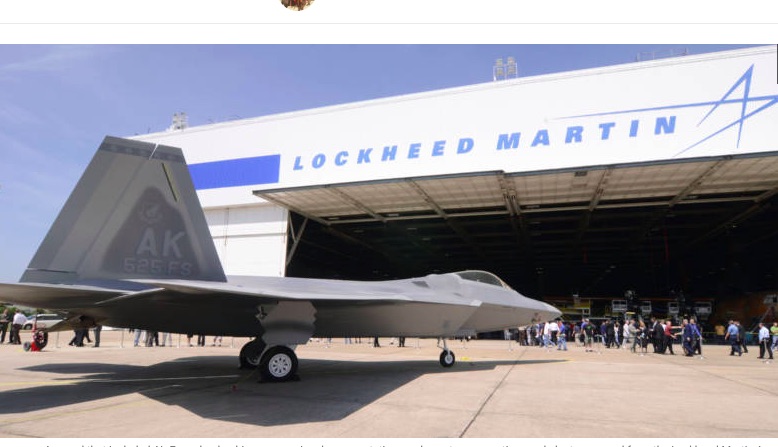DISARMAMENT & SECURITY .
An article by Peter Castagno in Citizen Truth (All Citizen Truth original articles licensed under a Creative Commons Attribution-Share Alike 3.0 License. )
Defense companies Lockheed Martin and Raytheon scored huge Pentagon contracts in anticipation of military conflict with Iran following the Trump administration’s assassination of Iran’s most powerful general late Thursday. Lockheed won a $1.93 billion contract to expand production of the controversial F-35 fighter jet program and Raytheon gained a $758 million deal to manufacture advanced medium-range air to air missiles (AMRAAM).

Defense stocks have soared in recent days as investors have expressed excitement at the prospect of greater violence in the Middle East:
“Big-name defense stocks are rising, with Northrop Grumman leading the rally last Friday. Northrop has risen 8% in the last five days, while Lockheed Martin and Raytheon have jumped around 4% and 2%, respectively,” reported Forbes Monday.
“The S&P 500 Aerospace & Defense (Industry) Index rose 3.7%, while the Dow Jones U.S. Aerospace & Defense Index went up 3.6% in the past five trading sessions,” as per Nasdaq on Tuesday.
General Dynamics also scored a $98 million contract to work on docking phased maintenance with the Naval Sea Systems Command.
Sarah Anderson, director of the Global Economy Project of the Institute for Policy Studies, notes that because top defense executives receive stock-based pay, they are already reaping a windfall from Trump’s military strike.
‘The Game Has Changed’
Amid escalating tensions with Iran, the US is deploying roughly 4,500 soldiers, as well as a wide array of ships, planes and other weapons to the Middle East.
Defense Secretary Mark Esper, who was Raytheon’s top lobbyist for seven years, said that “the game has changed” shortly before President Trump’s assassination of a top Iranian general on Thursday, which marked the first time the U.S. killed a top foreign military leader since World War II. Iraqi PM Abdul-Mahdi said that Soleimani was in Iraq by his invitation in an effort to deescalate tensions with Saudi Arabia.
The Iraqi parliament has since voted to expel U.S. forces from the country, which Trump responded to with threats of “very big” sanctions “like they’ve never seen before, ever.” Trump also threatened Iran with retaliation “perhaps in a disproportionate manner,” including destruction of cultural sites if the country takes military action, a threat the Pentagon has contradicted. The president has previously spoken of his support for torture and “taking out” the families of terrorists, all while civilian deaths abroad have sharply increased during his presidency.
(Article continued on the right column)
Does military spending lead to economic decline and collapse?
(Article continued from the left column)
Secretary of State Mike Pompeo said the assassination was to prevent an imminent attack on U.S. forces planned by the general, but provided no evidence for his claim, and other officials have offered divergent accounts. The Washington Post reported on Sunday that Pompeo had been pushing the move for months.
Economist Dean Baker noted that some defense stocks suspiciously surged before the attack:
Revolving Door
As Citizen Truth wrote earlier this week, critics argue that the revolving door between private defense contractors and the Pentagon improperly influences public policy to benefit private weapons manufacturers:
“In November 2018, the Project on Government Oversight (POGO) released an analysis of the Trump administration’s defense sector, finding 645 instances of federal employees working for the top 20 Pentagon contractors in fiscal year 2016. Most of them worked as lobbyists, where they used public funds allocated to them through Pentagon contracts to vouch for policies that would help their private employers profit.”
U.S. Department of Defense Secretary Mark Esper spent seven years as the top lobbyist at Raytheon, refused to recuse himself from decisions involving his former employer, and has refused to wait before returning to Raytheon after his public service. U.S. Army Secretary Ryan McCarthy is a former Lockheed Martin executive.
Former Air Force Secretary Heather Wilson, who resigned in 2019, was ranked by the nonprofit government watchdog group Citizens for Responsibility and Ethics in Washington as one of the “most corrupt members of Congress” for her work with Lockheed Martin. In 2015, Lockheed Martin paid a $4.7 million settlement to the Department of Justice after the revelation it had used taxpayer funds to hire lobbyists, including Wilson, for a $2.4 billion contract.
Critics argue that proponents of military action should disclose their ties to the arms industry. Beyond the numerous Pentagon officials connected to weapons manufacturers, many congressmembers are supported by companies like Lockheed Martin and hold stock in the defense industry. As Lee Fang reported Monday night, multiple pundits who have praised the recent assassination neglected to reveal their financial interests in the arms corporations preparing for war.
Defense Spending
The Intercept’s Lee Fang reported last year that Lockheed Martin CEO Marillyn Hewson said that “bipartisan support for defense spending,” favored her company, in addition to geopolitical tensions with countries like Iran.
House Democrats approved a $738 billion military package last month, even as it was stripped of amendments that would have forbidden the president from starting wars without congressional approval. Congress approved the colossal spending package a week after the Afghanistan papers were published, revealing how the U.S. government systematically deceived the public about the war in Afghanistan for 18 years.
In October, an Ex-Pentagon official said he was fired for speaking out about defense companies ripping off taxpayers. A 2016 Politico profile described the official, Shay Assad, as “the most hated man in the Pentagon.”
“Traditionally, defense stocks tend to outperform the market during periods of budget growth,” reported CCN. A CNBC analysis found that “shares of defense companies outperform the broader market in the six months after a crisis event in the Middle East.”